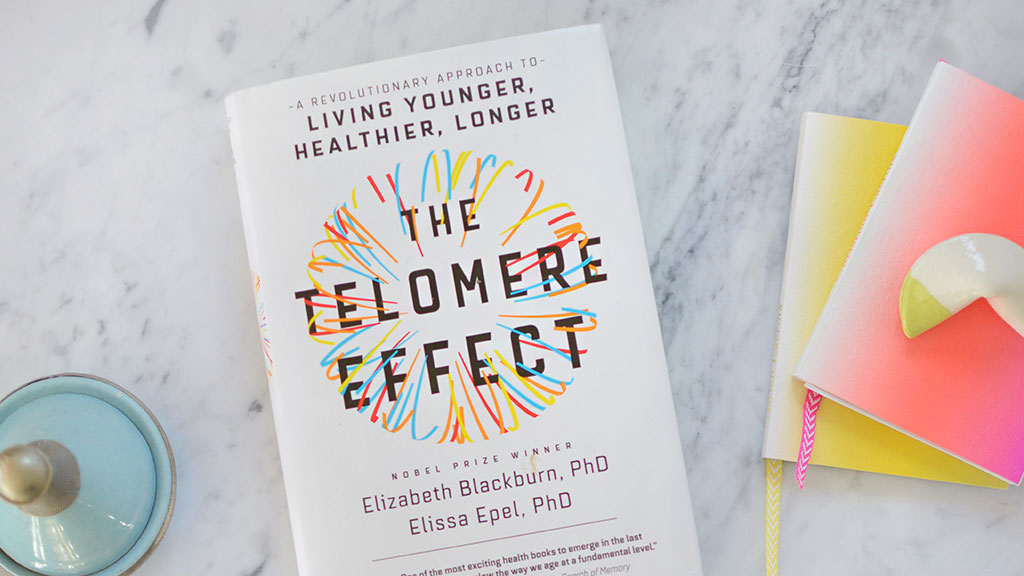Connect
5 Easy Ways to Stay Healthier Through Every Decade
We’re all about embracing aging, and that means doing what we can to feel great in our bodies through every decade. That’s why we’re extra excited about new research presented in the just-released book The Telomere Effect: The New Science of Living Younger. The book reveals that there are some basic things we can do—both mentally and physically—to keep our cells healthier, longer.
It all comes down to our telomeres, which are the protective caps on the ends of chromosomes that serve to protect our DNA and are linked to aging and disease. Turns out, our daily habits don’t merely impact how we feel; they also naturally affect the length of our telomeres (in the simplest terms, long telomeres are healthier, short telomeres are less healthy).
“Start by taking a look at your current routine,” says the book’s co-author and health psychologist Elissa Epel, Ph.D., director of the Aging, Metabolism and Emotions Center at the University of California, San Francisco. “You should be doing something positive for your mind and body at least five times per day.” Read on for more tips on how to keep your telomeres—and therefore your body and mind—healthier longer.
Catch better Z’s.
There’s been a lot of research in recent years showing the connection between sleep and health, so it’s no surprise that poor-quality sleep is linked to shorter (i.e. less healthy) telomeres. If you struggle to get at least six quality hours of sleep per night, give yourself a soothing bedtime ritual to follow: Drink some warm herbal tea, spend five minutes meditating or reading, listen to calming music, dim the lights and/or perform some gentle stretches.
Reassess your stress.
“It’s really common to spend more time anticipating stressful events than we should, which takes a toll on our bodies,” says Epel. “But instead of ‘worrying ahead,’ which isn’t constructive, try ‘planning ahead,’ which makes you feel better.” Also, if you’re faced with an immediate stress, like giving a speech or doing a race, practice changing your stress response from negative to positive. “When you start to feel your heart rate and adrenaline go up, shift your thoughts to how that’s going to improve—not hurt—your performance… and it will,” she says.
Move more.
Once again, exercise for the win. Not only does performing regular physical activities increase your fitness and wellbeing, but it also seems to protect you from the telomere shortening that typically occurs as a result of extreme stress.
Stay positive.
Ridding yourself of those negative, self-critical thoughts will do wonders for your mind and body. “People who wake up with feelings of joy, with a positive approach to the day/life, wake up with a lower cortisol spike and less stress,” says Epel. Practicing mindfulness-based stress-reduction techniques, such as meditation or deep breathing, could help give you the boost you need.
Focus on whole foods.
“Telomere science tells a very similar story as most of the current nutrition research,” notes Epel. Whole grains, vegetables, nuts/beans, fruits and foods rich in Omega-3s are all associated with healthier telomeres, while red meat and refined sugars appear to have the opposite effect.
We’re all about embracing aging, and that means doing what we can to feel great in our bodies through every decade. That’s why we’re extra excited about new research presented in the just-released book The Telomere Effect: The New Science of Living Younger. The book reveals that there are some basic things we can do—both mentally and physically—to keep our cells healthier, longer.
It all comes down to our telomeres, which are the protective caps on the ends of chromosomes that serve to protect our DNA and are linked to aging and disease. Turns out, our daily habits don’t merely impact how we feel; they also naturally affect the length of our telomeres (in the simplest terms, long telomeres are healthier, short telomeres are less healthy).
“Start by taking a look at your current routine,” says the book’s co-author and health psychologist Elissa Epel, Ph.D., director of the Aging, Metabolism and Emotions Center at the University of California, San Francisco. “You should be doing something positive for your mind and body at least five times per day.” Read on for more tips on how to keep your telomeres—and therefore your body and mind—healthier longer.
Catch better Z’s.
There’s been a lot of research in recent years showing the connection between sleep and health, so it’s no surprise that poor-quality sleep is linked to shorter (i.e. less healthy) telomeres. If you struggle to get at least six quality hours of sleep per night, give yourself a soothing bedtime ritual to follow: Drink some warm herbal tea, spend five minutes meditating or reading, listen to calming music, dim the lights and/or perform some gentle stretches.
Reassess your stress.
“It’s really common to spend more time anticipating stressful events than we should, which takes a toll on our bodies,” says Epel. “But instead of ‘worrying ahead,’ which isn’t constructive, try ‘planning ahead,’ which makes you feel better.” Also, if you’re faced with an immediate stress, like giving a speech or doing a race, practice changing your stress response from negative to positive. “When you start to feel your heart rate and adrenaline go up, shift your thoughts to how that’s going to improve—not hurt—your performance… and it will,” she says.
Move more.
Once again, exercise for the win. Not only does performing regular physical activities increase your fitness and wellbeing, but it also seems to protect you from the telomere shortening that typically occurs as a result of extreme stress.
Stay positive.
Ridding yourself of those negative, self-critical thoughts will do wonders for your mind and body. “People who wake up with feelings of joy, with a positive approach to the day/life, wake up with a lower cortisol spike and less stress,” says Epel. Practicing mindfulness-based stress-reduction techniques, such as meditation or deep breathing, could help give you the boost you need.
Focus on whole foods.
“Telomere science tells a very similar story as most of the current nutrition research,” notes Epel. Whole grains, vegetables, nuts/beans, fruits and foods rich in Omega-3s are all associated with healthier telomeres, while red meat and refined sugars appear to have the opposite effect.










One person has left a comment. Join the conversation!
View Comments